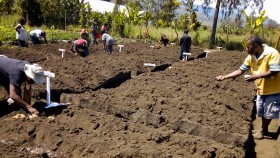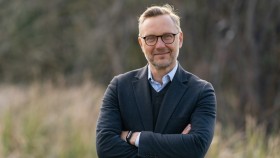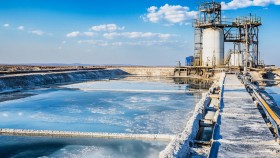‘From Brains to Batteries’ – ICEDS Member Profile, Associate Professor Marnie Shaw
Marnie Shaw’s path to becoming an Associate Professor in the ANU School of Engineering and Research Lead at the ANU Battery Storage and Grid Integration Program (BSGIP), was a little less than conventional. “I get a lot of surprised looks when I tell people about my background,” she says.
Having completed her PhD in Physics at the University of Melbourne, Marnie started working at a biotech start-up in Boston in the United States before undertaking research on brain imaging in Germany and Australia. Then four years ago, Marnie moved to ANU to work in renewables.
“From brains to batteries!” she jokes. But for Marnie, the change in career direction was a no-brainer. “I see the shift to a decarbonised energy system as the greatest and most important challenge I could work on,” she said.
Marnie’s work looks at battery storage and the services batteries can provide to support the uptake of renewable energy. One of her current research focuses is neighbourhood batteries, which are a medium-scale shared form of energy storage.
In particular, Marnie’s team is combining engineering and social research to understand both the technical benefits for the grid as well as the social benefits, with a focus on trying to understand whether this technology will work better for everyday householders.
“Neighbourhood batteries offer benefits compared to individual household batteries, including reduced cost and improved efficiency,” she said.
In 2022, Marnie was announced as the recipient of the Chloe Munro Scholarship for Transformational Leadership. The award honours the late Chloe Munro AO FTSE, a visionary pioneer of our path to clean energy in Australia. The scholarship will involve a seven-month development program for women in clean energy.
“The award means a lot to me,” said Marnie. “We all know that we need to improve gender balance in the clean energy sector so it’s a very positive step that the Clean Energy Council have set up this scholarship program to support women as they move into senior leadership roles in the sector. It also makes me personally feel very supported on my path forward.”
As a member of the ANU Institute for Climate, Energy and Disaster Solutions (ICEDS), Marnie has access to a network of researchers from across the University, all working to improve and progress solutions to the energy transition.
“One of the things I love about working in the renewable energy space is that it really feels like a team effort,” she said.
“ICEDS is an amazing team, with talented and enthusiastic people from a huge range of diverse backgrounds. We need this diversity to ensure the energy transition is not only technically successful, but also results in a system with energy users at the centre, and with fair distribution of economic benefits to all Australians.”











